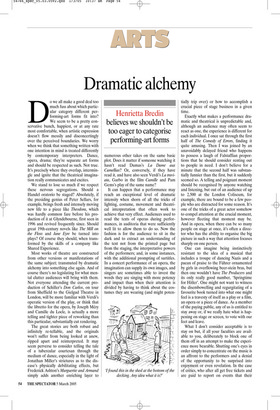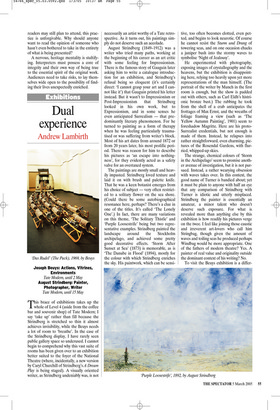Dramatic alchemy
Henrietta Bredin believes we shouldn’t be too eager to categorise performing-art forms
Do we all make a good deal too much fuss about which particular category different performing-art forms fit into? We seem to be a pretty conservative bunch, happiest, or at any rate most comfortable, when artistic expression doesn’t flow messily and disconcertingly over the perceived boundaries. We worry when we think that something written with one intention in mind is treated differently by contemporary interpreters. Dance, opera, drama; they’re separate art forms and should be respected as such. Not true. It’s precisely where they overlap, intermingle and ignite that the theatrical imagination really communicates and excites.
We stand to lose so much if we respect these nervous segregations. Should a Handel oratorio be staged? Absolutely, if the presiding genius of Peter Sellars, for example, brings fresh and intensely moving new life to a piece like Theodora, which was hardly common fare before his production of it at Glyndebourne, first seen in 1996 and revived frequently since. Should great 19th-century novels like The Mill on the Floss and Jane Eyre be turned into plays? Of course they should, when transformed by the skills of a company like Shared Experience.
Most works of theatre are constructed from other versions or manifestations of the same subject; transmuted by dramatic alchemy into something else again. And of course there’s no legislating for what mental clutter audiences will bring with them. Not everyone attending the current production of Schiller’s Don Carlos, on tour from Sheffield to the Gielgud Theatre in London, will be more familiar with Verdi’s operatic version of the play, or think that the libretto for the opera, by Joseph Méry and Camille du Locle, is actually a more telling and tighter piece of reworking than this particular, substantially cut rendering.
The great stories are both robust and infinitely re-tellable, and the originals won’t suffer from being looked at anew, ripped apart and reinterpreted. It may seem perverse to consider telling the tale of a tubercular courtesan through the medium of dance, especially in the light of Jonathan Miller’s strictures as to the disease’s physically debilitating effects, but Frederick Ashton’s Marguerite and Armand simply adds another enriching layer to numerous other takes on the same basic plot. Does it matter if someone watching it hasn’t read Dumas’s La Dame aux Camellias? Or, conversely, if they have read it, and have also seen Verdi’s La traviata, Garbo in the film Camille and Pam Gems’s play of the same name?
It can happen that a performance may reach an exceptional level of dramatic intensity when shorn of all the tricks of lighting, costume, movement and theatrical interpretation that often work to achieve that very effect. Audiences used to read the texts of operas during performances, in auditoria that were sufficiently well lit to allow them to do so. Now the fashion is for the audience to sit in the dark and to extract an understanding of the text not from the printed page but from the staging, the interpretative powers of the performers; and, in some instances, with the additional prompting of surtitles. In a concert performance of an opera, the imagination can supply its own images, and singers are sometimes able to invest the words they are singing with more potency and impact than when their attention is divided by having to think about the costumes they are wearing (and might poten tially trip over) or how to accomplish a crucial piece of stage business in a given time.
Exactly what makes a performance dramatic and theatrical is unpredictable and, although an audience may often seem to react as one, the experience is different for each individual. I once sat through the first half of The Comedy of Errors, finding it quite amusing. Then I was joined by an unavoidably delayed friend who happens to possess a laugh of Falstaffian proportions that he should consider renting out to people in need. I don’t believe for a minute that the second half was substantially funnier than the first, but it suddenly seemed so. A telling and poignant moment should be recognised by anyone watching and listening, but out of an audience of up to 2,500 at the London Coliseum, for example, there are bound to be a few people who are distracted for some reason. It’s one of the tricks of a great actor somehow to compel attention at the crucial moment, however fleeting that moment may be. And in opera, when there can be so many people on stage at once, it’s often a director who has the ability to organise the big picture in such a way that attention focuses sharply on one person.
One can imagine being instinctively resistant to the idea of a musical that includes a troupe of dancing Nazis and a paean of praise to the Führer ornamented by girls in overflowing beer-stein bras, but then one wouldn’t have The Producers and its only really good number, ‘Springtime for Hitler’. One might not want to witness the disembowelling and regurgitating of a favourite book turned into what one might feel is a travesty of itself as a play or a film, an opera or a piece of dance. As a member of the paying public, any of us is entitled to stay away or, if we really hate what is happening on stage or screen, to vote with our feet and leave.
What I don’t consider acceptable is to stay on but, if all your faculties are available to you, deliberately to block one of them off in an attempt to make the experience more bearable. Shutting one’s eyes in order simply to concentrate on the music is an affront to the performers and a denial of the opportunity to be surprised into enjoyment or even revelation. In the case of critics, who after all get free tickets and are paid to report on events that their readers may still plan to attend, this practice is unforgivable. Why should anyone want to read the opinion of someone who hasn’t even bothered to take in the entirety of what is being presented?
A nervous, heritage mentality is stultifying. Interpreters must possess a core of integrity and their own way of being true to the essential spirit of the original work. Audiences need to take risks, to lay themselves wide open to the possibility of finding their lives unexpectedly enriched.



























































 Previous page
Previous page